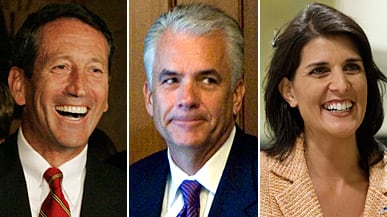His infidelity entered the popular lexicon, when "hiking the Appalachian trail" became a euphemism for sex with someone not your spouse.
The excuses for his disappearance, meanwhile, left some of us wondering about his mental acuity. But despite the looney-tunes nature of it all, Gov. Mark Sanford survived last summer's revelations about his affair with an Argentinean woman. Not only survived; he's thriving. According to a recent Rasmussen poll, the Love Guv's numbers have rebounded; he now enjoys a healthy 55 percent approval rating, making him significantly more popular than the president himself. That's a far cry from the days after the revelation of his affair, and that interminable press conference that followed, when he was left for dead by the chattering class.

What Sanford's affair suggests is that maybe, just maybe, the political sex scandal is finally dead. No second acts in American lives? If Sanford can rebound, maybe anybody can. Because Sanford is not the only politician to disprove Scott Fitzgerald's dictum. Just this year, we've had Nikki Haley trouncing her opponent in South Carolina's gubernatorial primary, allegations of infidelity barely denting her popularity. (In fact, it made some of us root for her, despite not sharing her political outlook.) Among others who have weathered their transgressions well: Gov. Eliot Spitzer (hookers); Sen. John Ensign (cheating on his own wife with the wife of a staffer); Sen. David Vitter (hookers) and President Bill Clinton (assorted.) All have rebounded, and today enjoy public lives.
Once upon a time in American politics—1987 to be specific—an extramarital liaison between the presumptive Democratic Presidential nominee and a younger, photogenic, woman destroyed that candidate's aspirations, even if the two had no professional connection. Perhaps it was that unforgettable picture—the Monkey Business t-shirt and Donna Rice in his lap—but Gary Hart's political career never recovered. (In New Hampshire polls afterward, his support appeared to have been cut in half.)
Now, a few decades later, it seems only pundits and op-ed writers care, while voters have moved beyond penalizing politicians for their sexual indiscretions.
Sex scandals are going the way of drugs and divorce—once-formidable obstacles to a political career that no longer seem to matter all that much. We now have a sitting president who may have actually exaggerated his drug use, for political effect. And Ronald Reagan did more to bury divorce as a political taboo than years of liberal chafing about traditional family values.
When it comes to stories about extramarital affairs, I would like to write that obit, too. But perhaps that's because I am originally from Denmark, a country that hasn't had a political sex scandal in modern history. Despite plenty of gossip in Copenhagen cafes, no politician has ever been booted from office because of a dalliance. In Denmark, a politician's ability to stay faithful to his or her spouse is simply not considered relevant when judging someone's ability to hold higher office.
What's made America's capitol more like Copenhagen? Maybe it's the sheer volume of scandals on the landscape today, robbing any one of its totemic power to shock and dismay voters. Maybe worrying about the sex lives of congressmen is a luxury, reserved for headier economic times. Or maybe politicians are just getting better at damage control.
Whatever it is, there's no question that the time lapse between sin and time served in the political doghouse is on the wane.
"The scandal-redemption cycle is much more sped up. What is the appropriate length of time? It does seem to be shortened," says Laura Kipnis, author of How To Become a Scandal: Adventures in Bad Behavior. "Sanford is an interesting example. He was seen as this buffoon yet managed to survive. People are getting savvier about how to ride it out."
Before the Summer of Sanford, of course, there was the Spring of Eliot Spitzer, with the New York Governor resigning after his predilection for young prostitutes was revealed. Given the performance of his successor, many of us now miss Eliot, who is still a powerful political player—not just because of his role as a CNN talking head, but by virtue of what that podium gives him: an excuse to fire verbal missiles against old political enemies, and people he just doesn't like –such as Andrew Cuomo, whom he described, with some verve, as the "dirtiest, nastiest political player out there."
On paper, Nevada Senator John Ensign would seem a prime candidate to succumb to his self-inflicted wounds. The Republican not only cheated on his wife, but did so with a woman who was married to one of his top aides, and who herself worked for him. The aide, Douglas Hampton, wrote a letter to Fox News in June 2009, stating that the "actions of Senator Ensign have ruined our lives and careers and left my family in shambles," asking for "justice, help and restitution." Apparently, the $96,000 that Ensigns parents had given the Hampton family earlier wasn't enough. The sordid revelations did deflate Ensign's poll numbers for a while. But a majority of Nevada voters didn't think Ensign should resign. And despite an on-going ethics investigation, Ensign has announced his plans to run for re-election in 2012.
Louisiana Senator David Vitter, for his part, survived association with a prostitution ring—the association being his telephone number inside the little black book belonging to the D.C. Madam. Having replaced Bob Livingston, who resigned in 1999 because of his affair, Vitter gave the appropriate, wife-at-the-side apologia, and was promptly forgiven. In fact, so complete was his recovery, he later allowed himself to bristle at comparisons with Spitzer. Today, he's well ahead in his bid for re-election.
Of course, there can be no story about sex and politics that doesn't acknowledge Bill Cl inton's place in history. The 42nd President of the United States was arguably the first harbinger that the sex scandal had lost its power to end political careers. Even feminists seemed unaffected by his antics. The deeper Ken Starr delved into Clinton's sexcapades, the more his approval ratings seemed to rise.
Today, despite that woman, and everything else, Clinton is a man redeemed. His rehabilitation has been so triumphant that one writer on this site recently wondered if Clinton had set a new bar for the successful post-Presidency.
As a member of the media, I acknowledge we sometimes chase things we shouldn't. But then you don't always know what the chase might reveal until it's done (see John Edwards, a notable exception to the new sex scandal rules, who bedded his way to political oblivion and doesn't appear in danger of emerging anytime soon, his efforts in Haiti notwithstanding). Still, I thought perhaps it's time we as journalists catch up with the voters, when I read the following item in the New York Post: "Insiders on Capitol Hill are buzzing about an upcoming New York Times exposé that will detail an alleged Boehner affair,". The Post was using a tried-and-true media fig leaf, especially useful when dealing with scandals involving sex: just write about what others are writing.
In terms of Republican leader John Boehner, the New York Times may or may not be preparing some kind of exposé, and granted, at issue could be a transgression of a more serious nature—an abuse of power, public office or a misuse of public funds. If so, the Times and everyone else of course should publish.
But a straight-up political sex scandal—two consenting adults, perhaps a wronged spouse—can't we, the media, be done with that as a political story now that the voters have tuned out?
A 1987 Miami Herald story examining this very issue—sex and political campaigns—ended with a quote from Gary Hart. "I think people are going to get tired of the question," he said. Maybe Hart was just ahead of his time.
Samuel P. Jacobs contributed to this report.
Louise Roug is an editor at The Daily Beast. She previously worked as a foreign and national correspondent for The Los Angeles Times, living in Baghdad and the Middle East for several years. She is a Pulitzer finalist and a recipient of a Hal Boyle Award from the Overseas Press Club. She just finished her first book.




